人教版(2019)必修 第一册Unit 4 Natural Disasters Discovering Useful Structures课件(共16张)
文档属性
| 名称 | 人教版(2019)必修 第一册Unit 4 Natural Disasters Discovering Useful Structures课件(共16张) |

|
|
| 格式 | pptx | ||
| 文件大小 | 150.0KB | ||
| 资源类型 | 教案 | ||
| 版本资源 | 人教版(2019) | ||
| 科目 | 英语 | ||
| 更新时间 | 2024-12-13 00:00:00 | ||
图片预览

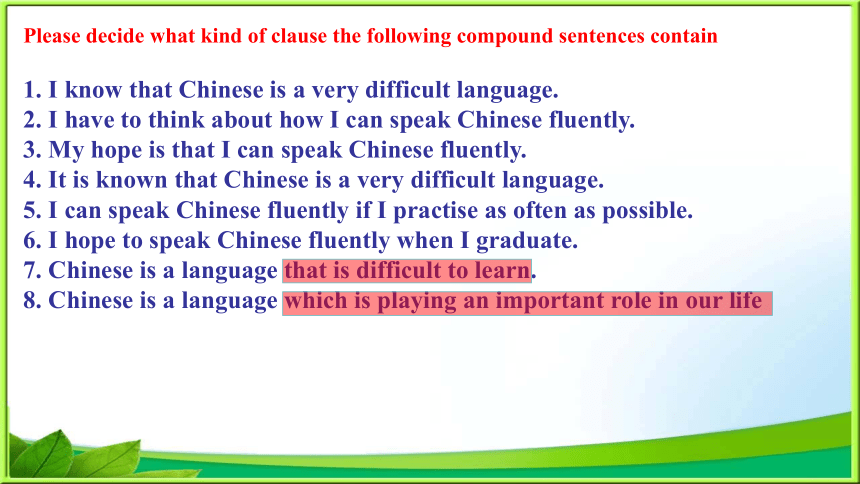
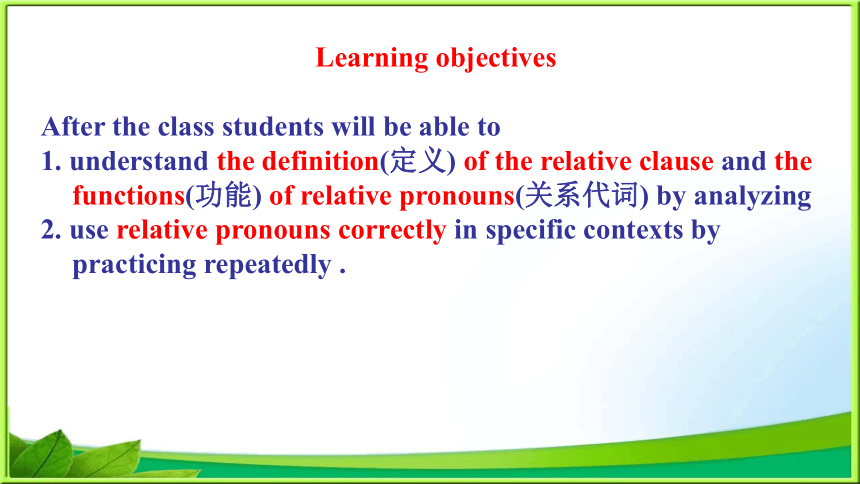
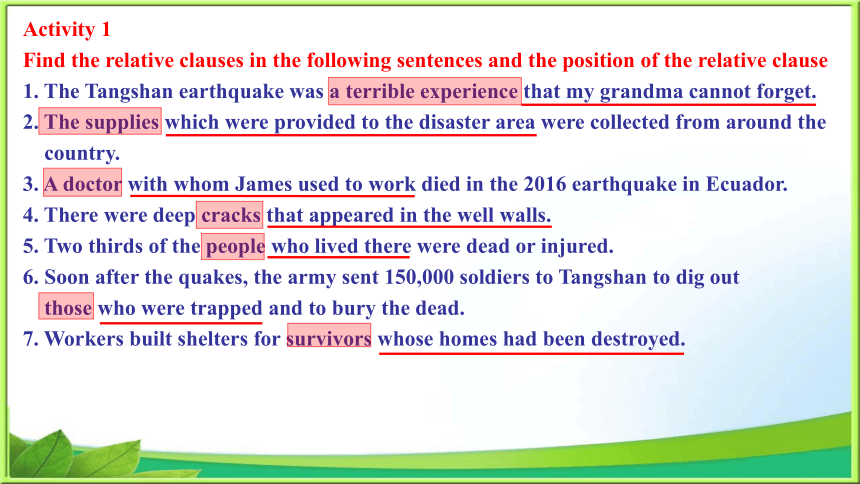
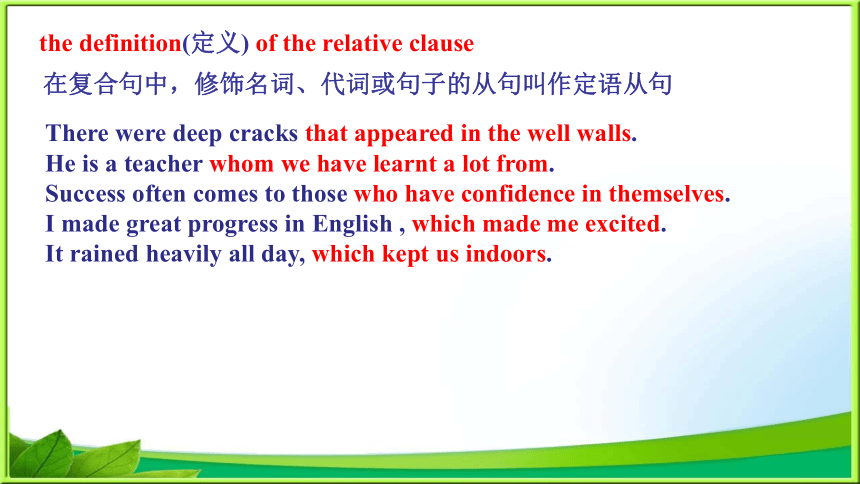
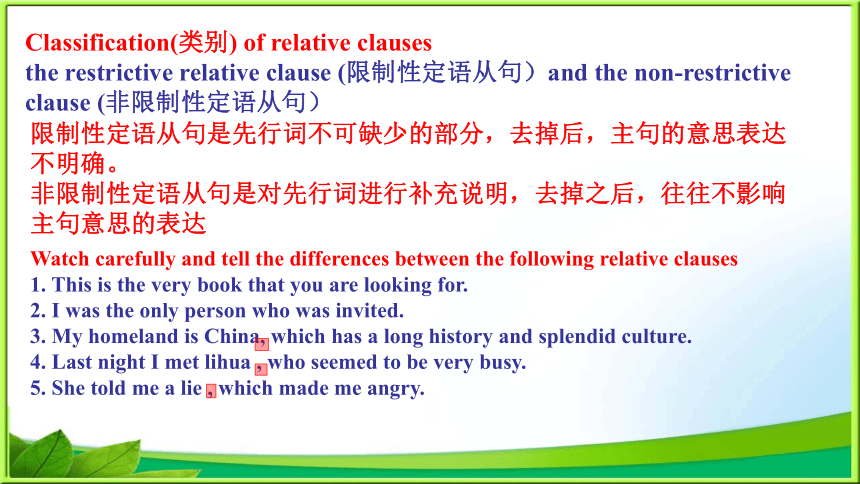
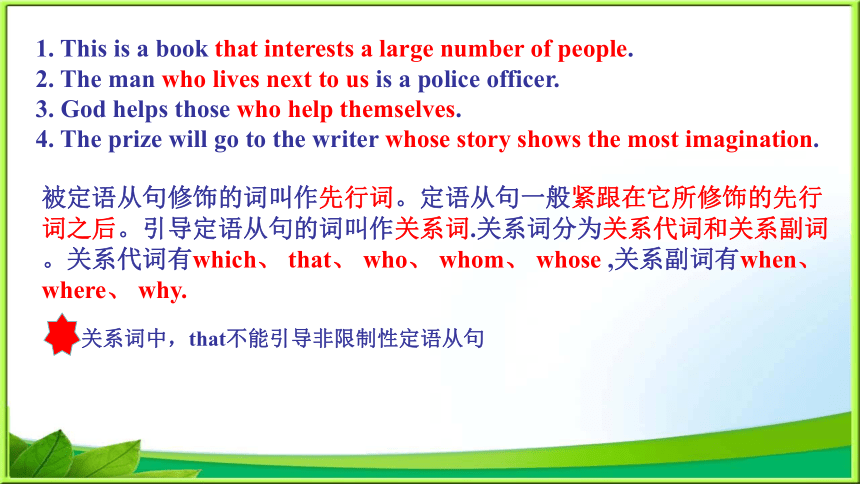
文档简介
(共16张PPT)
Unit 4 Natural Disasters
Discovering Useful Structures
the relative clauses
Please decide what kind of clause the following compound sentences contain
1. I know that Chinese is a very difficult language.
2. I have to think about how I can speak Chinese fluently.
3. My hope is that I can speak Chinese fluently.
4. It is known that Chinese is a very difficult language.
5. I can speak Chinese fluently if I practise as often as possible.
6. I hope to speak Chinese fluently when I graduate.
7. Chinese is a language that is difficult to learn.
8. Chinese is a language which is playing an important role in our life
Learning objectives
After the class students will be able to
1. understand the definition(定义) of the relative clause and the functions(功能) of relative pronouns(关系代词) by analyzing
2. use relative pronouns correctly in specific contexts by practicing repeatedly .
Activity 1
Find the relative clauses in the following sentences and the position of the relative clause
1. The Tangshan earthquake was a terrible experience that my grandma cannot forget.
2. The supplies which were provided to the disaster area were collected from around the
country.
3. A doctor with whom James used to work died in the 2016 earthquake in Ecuador.
4. There were deep cracks that appeared in the well walls.
5. Two thirds of the people who lived there were dead or injured.
6. Soon after the quakes, the army sent 150,000 soldiers to Tangshan to dig out
those who were trapped and to bury the dead.
7. Workers built shelters for survivors whose homes had been destroyed.
the definition(定义) of the relative clause
在复合句中,修饰名词、代词或句子的从句叫作定语从句
There were deep cracks that appeared in the well walls.
He is a teacher whom we have learnt a lot from.
Success often comes to those who have confidence in themselves.
I made great progress in English , which made me excited.
It rained heavily all day, which kept us indoors.
Classification(类别) of relative clauses
the restrictive relative clause (限制性定语从句)and the non-restrictive clause (非限制性定语从句)
Watch carefully and tell the differences between the following relative clauses
1. This is the very book that you are looking for.
2. I was the only person who was invited.
3. My homeland is China, which has a long history and splendid culture.
4. Last night I met lihua , who seemed to be very busy.
5. She told me a lie , which made me angry.
限制性定语从句是先行词不可缺少的部分,去掉后,主句的意思表达不明确。
非限制性定语从句是对先行词进行补充说明,去掉之后,往往不影响主句意思的表达
1. This is a book that interests a large number of people.
2. The man who lives next to us is a police officer.
3. God helps those who help themselves.
4. The prize will go to the writer whose story shows the most imagination.
被定语从句修饰的词叫作先行词。定语从句一般紧跟在它所修饰的先行词之后。引导定语从句的词叫作关系词.关系词分为关系代词和关系副词。关系代词有which、 that、 who、 whom、 whose ,关系副词有when、 where、 why.
关系词中,that不能引导非限制性定语从句
观察下列句子,分析先行词和关系代词的特征和作用
1. This is a book that/which interests a large number of people.
2. This is the book (that/which) I bought yesterday.
3. The expert who/that visited our school yesterday is from Cnada.
4. The expert (who/whom/that) we met in our school yestarday is from Cnada.
5. she is the girl whose brother is studying abroad.
6. He has written a book whose name I have forgotten.
关系代词which that who whom whose在定语从句中的作用:
引导从句,代替先行词并在从句中充当成分。
先行词 关系代词 指代 成分作用 备注
which
that
who
whom
whose
指物
作主语、宾语
指人 指物
作主语、宾语
作主语、宾语
指人
指人
指人 指物
作宾语
作定语
作宾语可省略
作宾语可省略
作宾语可省略
作宾语可省略
Activity 2
关系代词引导定语从句用法
1. 关系代词which指物, 在从句中做主语 宾语
2. 关系代词that既可以指人又可以指物,在从句中做主语 宾语
3. 关系代词who 指人, 在从句中做主语 宾语
4. 关系代词whom指人,在从句中做宾语
5. 关系代词whose即可指人又可以指物,在从句中做定语
6. 关系代词在定语从句中做宾语时,可以省略
用适当的关系代词填空
1. A plane is a machine ___________ can fly.
2. The fish ___________ we bought this morning were not fresh.
3. The girl _______________ we saw yesterday was Jim’s sister.
4. The boy ___________ broke the window is called Tom
5. This is the factory __________ was built last year.
6. This is the factory __________ we visited last year.
7. The injured boy _________ mother was lost in the disaster was taken to the hospital.
8. Yesterday I saw a film ________ leading actor is world-famous.
that/which
that/which
who/whom/that
who/that
that/which
that/which
whose
whose
将下面几组简单句合并为含定语从句的复合句
1. I have read the newspaper. It carries the important news.
2. I found the book. I lost it yesterday.
3. I talked with the man. His house was destroyed in the flood.
4. He is a man. you can safely depend on him.
5. We respect the doctor. He led the fight with COVID-19 in Wuhan
I have read the newspaper which/that carries the important news
I found the book that/which I lost yesterday.
I talked with the man whose house was destroyed in the flood.
He is a man who/whom/that you can safely depend on
We respect the doctor who/that led the fight with COVID-19 in Wuhan
1. This is the house ___________ we lived in last year.
This is the house in _______ we lived last year.
2. The factory ___________ I once worked in has taken on a new look.
The factory in _____ I once worked has taken on a new look.
3. He is the person _________________ you can turn to for help.
He is the person to _______ you can turn for help.
4. He is a clever boy ________________ his parents are proud of.
He is a clever boy of ______ his parents are proud.
关系代词在定语从句中做介词宾语的用法:
介词提前,指物时用关系代词_______. 指人时用关系代词_______
that/which
which
that/which
which
who/that/whom
whom
who/whom/that
whom
which
whom
用适当的关系代词填空
1. He is a teacher from ________ we can learn a lot.
2. Great changes have taken place in the city in ______ we live.
3. She has many novels, some of ______ are interesting.
4. The doctor with _______ you used to work died in the earthquake.
5. The woman wrote a thank-you letter to the soldier by _____ she was rescued.
whom
which
which
whom
whom
但在下列情况下在限制性定语从句中关系代词指物时用that 不用which
1. 当先行词为all anything everything nothing等不定代词时
He set down everything that I said. He did all that he could to help me.
2. 当先行词被序数词和形容词最高级修饰时
This is the most beautiful city that I have visited.
The first lesson that I have learned will never be forgotten.
3. 当先行词被all, every, the only, the very, the right修饰时
He is reading the very book that you gave him last night.
He ate all the food that was provided by Mom.
That is the only thing that we can do now.
4. 当先行词既指人又指物时
We often talk about the persons and things that we remember.
关系代词that 和 which
在限制性定语从句中关系代词指物时that和which通常可以换用。
This is the book (that/which) I bought yesterday.
This is the novel that/which is popular with teengers.
定语从句中用关系代词which不用that
I have seen the film “The Wandering Earth”, which is well worth seeing
I love Beijing, which is very beautiful.
This is the factory in which I once worked
This is the book about which we talked yesterday.
Women have vote rights, which were impossible a century ago.
It rained heavily yesterday, which made us stay at home all day.
指物时在非限制性定语从句中用which不用that. that不能引导非限制性定语从句
在介词提前的定语从句中
指代前面整个句子
Summary
定语从句的定义
定语从句的种类
关系代词which that who whom whose在定语从句中的用法
介词提前时关系代词的选择
关系代词that和which的用法区别
Homework
配套检测卷P182页I II III
Unit 4 Natural Disasters
Discovering Useful Structures
the relative clauses
Please decide what kind of clause the following compound sentences contain
1. I know that Chinese is a very difficult language.
2. I have to think about how I can speak Chinese fluently.
3. My hope is that I can speak Chinese fluently.
4. It is known that Chinese is a very difficult language.
5. I can speak Chinese fluently if I practise as often as possible.
6. I hope to speak Chinese fluently when I graduate.
7. Chinese is a language that is difficult to learn.
8. Chinese is a language which is playing an important role in our life
Learning objectives
After the class students will be able to
1. understand the definition(定义) of the relative clause and the functions(功能) of relative pronouns(关系代词) by analyzing
2. use relative pronouns correctly in specific contexts by practicing repeatedly .
Activity 1
Find the relative clauses in the following sentences and the position of the relative clause
1. The Tangshan earthquake was a terrible experience that my grandma cannot forget.
2. The supplies which were provided to the disaster area were collected from around the
country.
3. A doctor with whom James used to work died in the 2016 earthquake in Ecuador.
4. There were deep cracks that appeared in the well walls.
5. Two thirds of the people who lived there were dead or injured.
6. Soon after the quakes, the army sent 150,000 soldiers to Tangshan to dig out
those who were trapped and to bury the dead.
7. Workers built shelters for survivors whose homes had been destroyed.
the definition(定义) of the relative clause
在复合句中,修饰名词、代词或句子的从句叫作定语从句
There were deep cracks that appeared in the well walls.
He is a teacher whom we have learnt a lot from.
Success often comes to those who have confidence in themselves.
I made great progress in English , which made me excited.
It rained heavily all day, which kept us indoors.
Classification(类别) of relative clauses
the restrictive relative clause (限制性定语从句)and the non-restrictive clause (非限制性定语从句)
Watch carefully and tell the differences between the following relative clauses
1. This is the very book that you are looking for.
2. I was the only person who was invited.
3. My homeland is China, which has a long history and splendid culture.
4. Last night I met lihua , who seemed to be very busy.
5. She told me a lie , which made me angry.
限制性定语从句是先行词不可缺少的部分,去掉后,主句的意思表达不明确。
非限制性定语从句是对先行词进行补充说明,去掉之后,往往不影响主句意思的表达
1. This is a book that interests a large number of people.
2. The man who lives next to us is a police officer.
3. God helps those who help themselves.
4. The prize will go to the writer whose story shows the most imagination.
被定语从句修饰的词叫作先行词。定语从句一般紧跟在它所修饰的先行词之后。引导定语从句的词叫作关系词.关系词分为关系代词和关系副词。关系代词有which、 that、 who、 whom、 whose ,关系副词有when、 where、 why.
关系词中,that不能引导非限制性定语从句
观察下列句子,分析先行词和关系代词的特征和作用
1. This is a book that/which interests a large number of people.
2. This is the book (that/which) I bought yesterday.
3. The expert who/that visited our school yesterday is from Cnada.
4. The expert (who/whom/that) we met in our school yestarday is from Cnada.
5. she is the girl whose brother is studying abroad.
6. He has written a book whose name I have forgotten.
关系代词which that who whom whose在定语从句中的作用:
引导从句,代替先行词并在从句中充当成分。
先行词 关系代词 指代 成分作用 备注
which
that
who
whom
whose
指物
作主语、宾语
指人 指物
作主语、宾语
作主语、宾语
指人
指人
指人 指物
作宾语
作定语
作宾语可省略
作宾语可省略
作宾语可省略
作宾语可省略
Activity 2
关系代词引导定语从句用法
1. 关系代词which指物, 在从句中做主语 宾语
2. 关系代词that既可以指人又可以指物,在从句中做主语 宾语
3. 关系代词who 指人, 在从句中做主语 宾语
4. 关系代词whom指人,在从句中做宾语
5. 关系代词whose即可指人又可以指物,在从句中做定语
6. 关系代词在定语从句中做宾语时,可以省略
用适当的关系代词填空
1. A plane is a machine ___________ can fly.
2. The fish ___________ we bought this morning were not fresh.
3. The girl _______________ we saw yesterday was Jim’s sister.
4. The boy ___________ broke the window is called Tom
5. This is the factory __________ was built last year.
6. This is the factory __________ we visited last year.
7. The injured boy _________ mother was lost in the disaster was taken to the hospital.
8. Yesterday I saw a film ________ leading actor is world-famous.
that/which
that/which
who/whom/that
who/that
that/which
that/which
whose
whose
将下面几组简单句合并为含定语从句的复合句
1. I have read the newspaper. It carries the important news.
2. I found the book. I lost it yesterday.
3. I talked with the man. His house was destroyed in the flood.
4. He is a man. you can safely depend on him.
5. We respect the doctor. He led the fight with COVID-19 in Wuhan
I have read the newspaper which/that carries the important news
I found the book that/which I lost yesterday.
I talked with the man whose house was destroyed in the flood.
He is a man who/whom/that you can safely depend on
We respect the doctor who/that led the fight with COVID-19 in Wuhan
1. This is the house ___________ we lived in last year.
This is the house in _______ we lived last year.
2. The factory ___________ I once worked in has taken on a new look.
The factory in _____ I once worked has taken on a new look.
3. He is the person _________________ you can turn to for help.
He is the person to _______ you can turn for help.
4. He is a clever boy ________________ his parents are proud of.
He is a clever boy of ______ his parents are proud.
关系代词在定语从句中做介词宾语的用法:
介词提前,指物时用关系代词_______. 指人时用关系代词_______
that/which
which
that/which
which
who/that/whom
whom
who/whom/that
whom
which
whom
用适当的关系代词填空
1. He is a teacher from ________ we can learn a lot.
2. Great changes have taken place in the city in ______ we live.
3. She has many novels, some of ______ are interesting.
4. The doctor with _______ you used to work died in the earthquake.
5. The woman wrote a thank-you letter to the soldier by _____ she was rescued.
whom
which
which
whom
whom
但在下列情况下在限制性定语从句中关系代词指物时用that 不用which
1. 当先行词为all anything everything nothing等不定代词时
He set down everything that I said. He did all that he could to help me.
2. 当先行词被序数词和形容词最高级修饰时
This is the most beautiful city that I have visited.
The first lesson that I have learned will never be forgotten.
3. 当先行词被all, every, the only, the very, the right修饰时
He is reading the very book that you gave him last night.
He ate all the food that was provided by Mom.
That is the only thing that we can do now.
4. 当先行词既指人又指物时
We often talk about the persons and things that we remember.
关系代词that 和 which
在限制性定语从句中关系代词指物时that和which通常可以换用。
This is the book (that/which) I bought yesterday.
This is the novel that/which is popular with teengers.
定语从句中用关系代词which不用that
I have seen the film “The Wandering Earth”, which is well worth seeing
I love Beijing, which is very beautiful.
This is the factory in which I once worked
This is the book about which we talked yesterday.
Women have vote rights, which were impossible a century ago.
It rained heavily yesterday, which made us stay at home all day.
指物时在非限制性定语从句中用which不用that. that不能引导非限制性定语从句
在介词提前的定语从句中
指代前面整个句子
Summary
定语从句的定义
定语从句的种类
关系代词which that who whom whose在定语从句中的用法
介词提前时关系代词的选择
关系代词that和which的用法区别
Homework
配套检测卷P182页I II III
